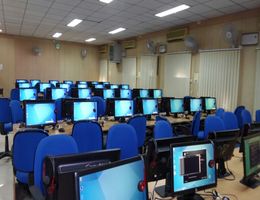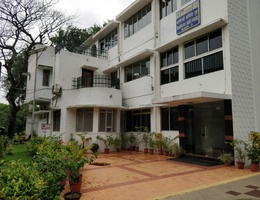Overview
Publications
Recruitment
Intranet
Glimpse of CIFRI
The ICAR-CIFRI organized Brainstorming session on “Cage culture in inland open waters”
on 16 th March 2018 at Barrackpore. This brainstorming session encompassed diverse aspects
related to inland cage culture, viz., the status of cage culture in reservoirs/wetlands of India,
species cultured, feeding and health management, need for diversification of species etc. The
session is aimed at promoting cage culture technology developed by ICAR-CIFRI among
Farmers, Public Sector Units (PSUs) like NHPC, NEPCCO, Entrepreneurs, State Fisheries
Departments, Universities, NGOs and different Water Resource Departments. Mr. M. S.
Dhakad, MD, MP Fisheries Federation was the chief guest with Dr. N. P. Singh, Director,
ICAR-NIASM, Baramati and Madhumita Mukherjee, Addional Director, Department of
Fisheries, Government of West Bengal as guest of honour.
The session commenced with welcome address by Dr. B. K. Das, Director, ICAR-CIFRI, Barrackpore. In his remarks he gave an overview of status of cage culture in inland open waters of India and highlighted role of ICAR-CIFRI in pioneering and developing the cage culture technology.
Mr. M. S. Dhakad, MD, MP Fisheries Federation and Chief guest of the session highlighted the potential of cage culture in achieving nutritional through secong blue revolution in the country and called upon the ICAR-CIFRI for attaing thios goal. He stressed upon making cage culture technology economically feasable and viable for small scale farmers of the country.
Dr. N. P Singh, Director, NIASM, Baramati congratulated the institute for completing more than seventy glorious years of excellence in research and development in the field of inland fisheries and emphasized on input requirement with special reference to availability of seed and feed for success of cage farming.
Dr. A. K. Das, PS, ICAR-CIFRI delivered a presentation on CIFRIs experience on cage culture: retrospect and prospects. In his presentation he covered important aspects like evolution of cage culture technology by ICAR-CIFRI, its present status, private players in cage culture, success storeys in different parts of country and way forward for development of cage culture.
Dr. B. C. Jha addressed the gathering and shared his experiences on cage culrture and raised concerns over carrying capacity of reservoirs for expansion of cage farming.
In her remarks, Dr. Madhumita Mukherjee, Addnl. Director, DoF, Govt of West Bengal congratulated the institute for celebrating its platinum jubilee and said the states are looking forward to ICAR-CIFRI for development of cage culture protocols for various species and skill development for development of cage culture. She highlighted the initiatives taken by State of West Bengal for cage culrture in coal pits and insisted ICAR-CIFRI to come up with region specific cage culture models.
Dr. Chaya Yadav, Director FCS Lanja Maharashtra and Dr. Kiran dubey, PS, ICAR- CIFE shared their experiences on cage culture in reservoirs. Dr. Dubey shared experiences on carp and mahseer seed raising in reservoirs of Himachal Pradesh and Maharashtra and community based cage culture in Dimbhe reservoirs and participation of women in cage culture of ormanental fish. Dr Yadav shared success of the FCS Lanja in cage culture of Pangas.
A series of publicatios on cage culture were also released on this occasion. The inaugaral session ended with a vote of thanks proposed by Dr. A. K. Sahoo, Scientist.
The session was attended by experts, representatives from state fisheries departments, stakeholders & private entrepreneurs (ABIS, GROWELL, GARWARE, SHALIMAR, AQUATICA etc) PSUs (NHPC, NEEPCO) NGOs and progressive farmers who shared their experiences in cage culture.
A Farmers-Entrepreneurs- Scientist Interface meet was organised in the afternoon session where progressive cage farmers from Odisha and Jharkhand shared their experiences. Stae fisheries officials of Jharkhand, Andhra Pradesh also shared their experiences with the house. Expert scientists and entrepreneurs interacted with the farmers for renu,erative cage farming in inland open waters.
The session commenced with welcome address by Dr. B. K. Das, Director, ICAR-CIFRI, Barrackpore. In his remarks he gave an overview of status of cage culture in inland open waters of India and highlighted role of ICAR-CIFRI in pioneering and developing the cage culture technology.
Mr. M. S. Dhakad, MD, MP Fisheries Federation and Chief guest of the session highlighted the potential of cage culture in achieving nutritional through secong blue revolution in the country and called upon the ICAR-CIFRI for attaing thios goal. He stressed upon making cage culture technology economically feasable and viable for small scale farmers of the country.
Dr. N. P Singh, Director, NIASM, Baramati congratulated the institute for completing more than seventy glorious years of excellence in research and development in the field of inland fisheries and emphasized on input requirement with special reference to availability of seed and feed for success of cage farming.
Dr. A. K. Das, PS, ICAR-CIFRI delivered a presentation on CIFRIs experience on cage culture: retrospect and prospects. In his presentation he covered important aspects like evolution of cage culture technology by ICAR-CIFRI, its present status, private players in cage culture, success storeys in different parts of country and way forward for development of cage culture.
Dr. B. C. Jha addressed the gathering and shared his experiences on cage culrture and raised concerns over carrying capacity of reservoirs for expansion of cage farming.
In her remarks, Dr. Madhumita Mukherjee, Addnl. Director, DoF, Govt of West Bengal congratulated the institute for celebrating its platinum jubilee and said the states are looking forward to ICAR-CIFRI for development of cage culture protocols for various species and skill development for development of cage culture. She highlighted the initiatives taken by State of West Bengal for cage culrture in coal pits and insisted ICAR-CIFRI to come up with region specific cage culture models.
Dr. Chaya Yadav, Director FCS Lanja Maharashtra and Dr. Kiran dubey, PS, ICAR- CIFE shared their experiences on cage culture in reservoirs. Dr. Dubey shared experiences on carp and mahseer seed raising in reservoirs of Himachal Pradesh and Maharashtra and community based cage culture in Dimbhe reservoirs and participation of women in cage culture of ormanental fish. Dr Yadav shared success of the FCS Lanja in cage culture of Pangas.
A series of publicatios on cage culture were also released on this occasion. The inaugaral session ended with a vote of thanks proposed by Dr. A. K. Sahoo, Scientist.
The session was attended by experts, representatives from state fisheries departments, stakeholders & private entrepreneurs (ABIS, GROWELL, GARWARE, SHALIMAR, AQUATICA etc) PSUs (NHPC, NEEPCO) NGOs and progressive farmers who shared their experiences in cage culture.
A Farmers-Entrepreneurs- Scientist Interface meet was organised in the afternoon session where progressive cage farmers from Odisha and Jharkhand shared their experiences. Stae fisheries officials of Jharkhand, Andhra Pradesh also shared their experiences with the house. Expert scientists and entrepreneurs interacted with the farmers for renu,erative cage farming in inland open waters.










